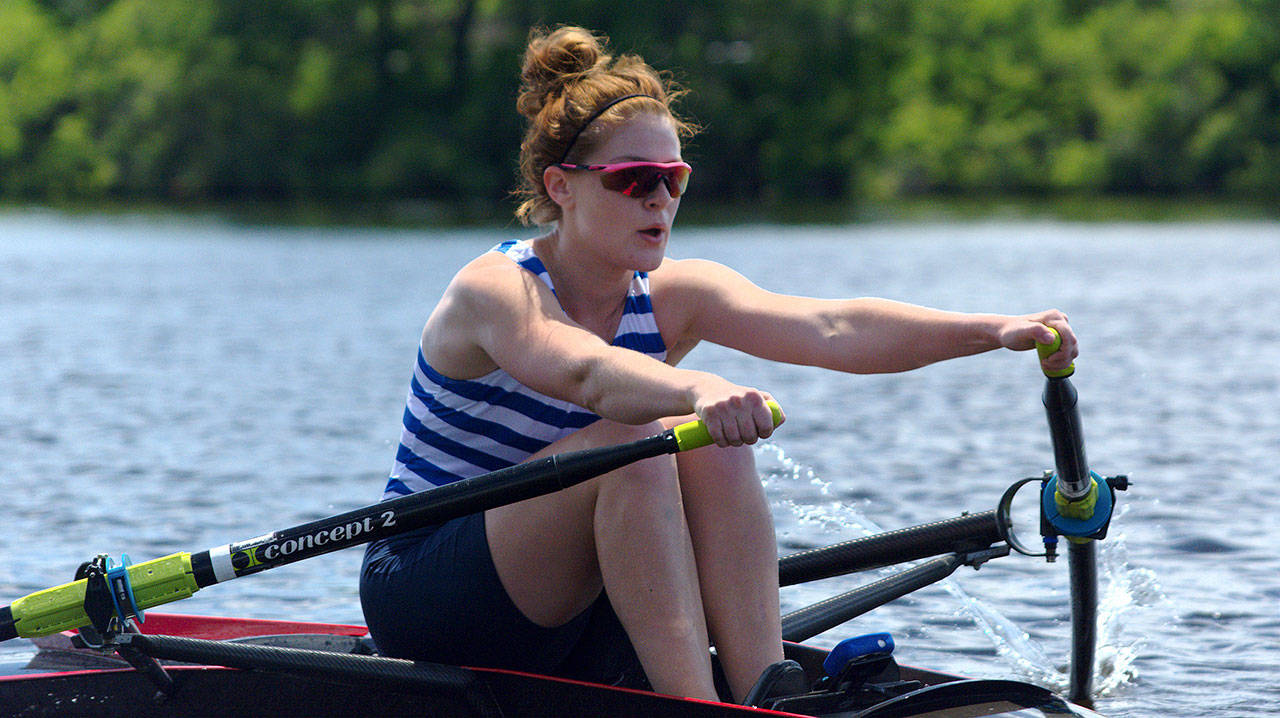By Rick Anderson
For The Daily World
Savannah Davison believes she has changed considerably, both physically and mentally, since her 2016 graduation from Washington State University.
The Aberdeen High School graduate’s ultimate goal, however, remains the same.
The 25-year-old Davison continues to set her sights on a berth in women’s rowing at the 2020 Olympics in Tokyo.
A member of the Saratoga Rowing Association’s elite program in New York, she took an important step in realizing that objective by earning three gold medals at the Royal Canadian Henley Regatta last month in Ontario.
She teamed with Kristi Wagner to capture the women’s senior doubles event. Both were on the winning crews for the Dash 8 plus and Camp 8 plus races.
Davison rates the experience as a career highlight.
“The competition at Canadian Henley can be pretty tough. There are usually some fast Canadians and Americans racing,” she explained. “Canadian Henley also only gives you a medal if you place first, so it is an all-or-nothing experience.”
By devoting much of her time at Saratoga to training, Davison predictably has increased her strength. She works out at least twice, sometimes three times per day, although she has eased off recently due to a rib injury.
“We do fitness tests on the rowing machine to track our improvement and my current tests on those are significantly improved from college,” she reported. “I am pulling times I never imagined I could pull.”
As important, from her standpoint, Davison has tempered her perfectionist nature.
“I’m in a much better place mentally than I was in 2016,” she said. “I’ve learned to cope with bad athletic performances and stay positive.
“In college, I struggled with my mental health in regards to athletics,” Davison added. “I have spent so much time defining myself in terms of being a high-performance athlete that when things went poorly, my mind twisted my athletic performance into meaning I was a bad person. I’ve learned to relax a bit and be kinder to myself when my athletic performances are not where they should be.”
A standout swimmer at Aberdeen, Davison became addicted to rowing while at Washington State. As a junior, she was part of an eight-oared women’s crew that placed ninth in the NCAA Championships.
Following graduation, she moved to the Boston area to join the Riverside Boat Club. She enjoyed Boston but found the city’s high cost of living stressful and relocated to Saratoga Springs, in upstate New York, this year.
As part of the Saratoga Rowing Association’s elite program, Davison devotes most of each day to rowing. The association picks up her living expenses in exchange for her coaching the middle school rowing program and assisting with various tasks around the boathouse. She was the association’s learn-to-row coordinator this summer, an experience she enjoyed.
In what passes for her free time, Davison works a few shifts at an area Starbucks store. She has also started her own company (based on one of her Instagram accounts) that contracts to a clothing company that sells gear at all major regattas.
“The extra work is not 100 percent necessary, but is a good way to get away from being obsessed with rowing all the time,” she said.
Olympic women’s rowing consists of six classifications, ranging from single sculls to eight-oared crews.
While open to qualifying in any event, Davison does most of her training in sculls (a light, narrow vessel in which each rower handles two oars). She also expressed a preference for rowing with partners rather than as a single.
Unlike swimming or track and field, there is no single method of qualifying for the U.S. Olympic team. Depending on the classification, team members are chosen from either attending a camp or competing in a selection regatta. Davison is non-committal on which option she will choose.
Focusing on long-term goals has required an attitude adjustment.
“You cycle your training so you have easy periods of training as well as difficult periods,” Davison said. “It took some time to shift my focus from trying to work at 110 percent all the time to pacing myself over time. In college, if I needed time off, I would panic. That doesn’t happen now.”:
Despite her determination and extensive preparation, Davison doesn’t view making the 2020 U.S. Olympic team as an all-or-nothing proposition.
“A lot of rowers have success into their 30s,” she observed. “It’s more that if 2020 comes and goes (without making it to Tokyo) whether I see myself continuing. It’s not so much an age limit.”
And even if her Olympic dream winds up unfulfilled, Davison could eventually help other aspiring rowers reach theirs.
“I’ve been really thinking about the idea of opening up a camp in an area where there isn’t rowing and starting it with young people,” she said.


